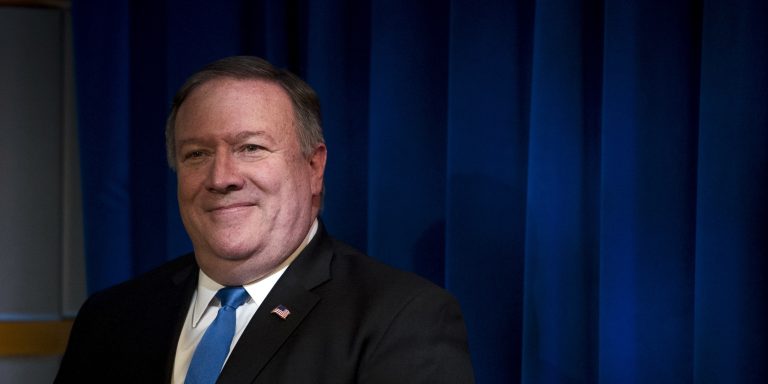INTELBRIEF
September 24, 2018
IntelBrief: America’s Myopic Middle East Policy Favors Profits Over People

- On September 12, U.S. Secretary of State Mike Pompeo certified that Saudi Arabia and the United Arab Emirates were doing enough to avoid killing civilians for the U.S. to keep selling them weapons.
- Reports surfaced on September 20 that suggested the certification was approved to protect an estimated $2 billion in arms sales to Gulf countries.
- It is unclear if the reporting will have any meaningful impact on U.S. support for the catastrophe in Yemen.
- The U.S. is the world’s largest arms dealer and increasing these sales continues to be a major factor in Washington’s approach to foreign policy, especially under the Trump administration.
.
On September 12, U.S. Secretary of State Pompeo informed Congress of the State Department’s intent to certify that Saudi Arabia and the United Arab Emirates (UAE) were adequately protecting the lives of Yemeni civilians during their respective bombing strikes. In a statement, Secretary Pompeo noted that Saudi Arabia and the UAE ‘are undertaking demonstrable actions to reduce the risk of harm to civilians and civilian infrastructure.’ This certification comes less than a month after a U.N. report found that Riyadh and Abu Dhabi were likely committing war crimes with their indiscriminate strikes, and five weeks after an errant Saudi air strike destroyed a school bus, killing 51 Yemeni civilians, including 40 children.
The certification by the State Department is a requirement for the U.S. to continue supporting its Gulf allies in the conflict in Yemen. The U.S. has directly supported the joint Saudi-Emirati air campaign against the Houthi rebels in Yemen by providing in-flight refueling, intelligence and targeting support, and massive sales of weapons. The arms sales were an important factor in the certification, although it should be noted that in his memo Secretary Pompeo did state that ‘recent civilian casualty incidents indicate insufficient implementation of reforms and targeting practices.’
A September 20 report by the Wall Street Journal states that the State Department’s Bureau of Near Eastern Affairs, the Bureau of Political-Military Affairs, the Bureau of Democracy, Human Rights and Labor, and the Bureau of Population, Refugees and Migration, along with legal offices, all recommended that Secretary Pompeo reject the certification for Saudi Arabia and the UAE due to a ‘lack of progress on mitigating civilian casualties.’ These bureaus collectively argued that moving forward with certification would ‘provide no incentive for Saudi leadership to take our diplomatic messaging seriously.’ The precedent would likely hamstring diplomatic efforts geared toward negotiating a political settlement in the future, while simultaneously signaling that arms sales trumped human rights.
These bureaus were not saying that the U.S. should completely curtail military support to KSA and the UAE. Moreover, Secretary of Defense James Mattis urged Pompeo to re-certify, positive affirmation that falls in line with what the Pentagon sees as aligning with U.S. national security interests in the region. Rather, most of the relevant bureaus were merely confirming what is readily apparent to anyone observing the conflict in Yemen— even after several well-publicized atrocities, Saudi Arabia and the UAE are still not doing enough to protect civilian lives. This acknowledgment of the obvious appears to have been too critical for the notoriously sensitive Saudi government,the largest single purchaser of American-made arms, which in turn would threaten future weapons sales to the kingdom.
According to memos obtained by the Wall Street Journal, Secretary Pompeo sided with the lone voice supporting certification, though not for reasons of diplomacy but rather for financial reasons. The Bureau of Legislative Affairs argued that ‘lack of certification will negatively impact pending arms transfers’ and then went further, adding ‘failure to certify may also negatively impact future foreign military sales and direct commercial sales to the region.’
As the world’s largest arms dealer—accounting for 34% of global arms sales in 2017 and likely to set new records in 2018—the U.S. has always maintained a complicated stance on peace through U.S. arms. Since 2001, global arms sales have consistently risen, following a dramatic drop in the decade after the fall of the Berlin Wall and the end of the Cold War. The Middle East is the largest growing sector for arms purchases and the U.S. is determined to increase its already dominant market share of sales to countries like Saudi Arabia. The pervasive and all-encompassing regional proxy conflict between the Saudis and Iran further fuel this cycle. Even muted criticism on the killing of civilians that could threaten future arms sales are anathema to current policy priorities.
Yemen is a clear-cut example of the U.S. prioritizing arms sales over conflict resolution. The U.S. has continued to support Saudi Arabia and the UAE, arguing that without American oversight the collateral damage in Yemen would be even worse, although this is difficult to imagine. There is legitimate concern in Congress that the U.S. could be putting its personnel at risk for legal exposure to war crimes. Accordingly, the current administration has decided that consequence-free criticism from Congress is still preferable to the financial consequences of criticizing Saudi Arabia over the killing of civilians.
.
For tailored research and analysis, please contact: info@thesoufancenter.org
[video poster="https://thesoufancenter.org/wp-content/uploads/2018/09/AP_18228690677298.jpg" width="960" height="540" mp4="https://thesoufancenter.org/wp-content/uploads/2018/09/IB-0924.mp4"][/video]